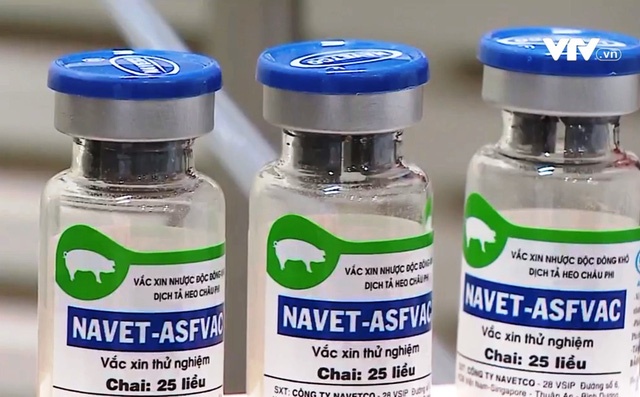Vietnam steps closer to African swine fever vaccine
 |
| Vietnam steps closer to African swine fever vaccine, photo VTV |
Deputy Minister of Agriculture and Rural Development Phung Duc Tien told a meeting last week that his ministry (MARD) assigned authorities to complete the procedure for the debut of a commercial African swine fever (ASF) vaccine to serve the development of domestic livestock and export to overseas.
A vaccine is being studied by Dabaco Group thanks to the transfer of biological products from the US Department of Agriculture’s research centre for exotic species diseases. The US has studied the virus for a decade and in 2020, Vietnam requested the US to transfer genetically-altered samples of the virus it has developed to facilitate vaccine production.
“The testing is completed. The final step is to complete the procedure for debuting the products, which is expected to be marketed in late March or early second quarter this year,” Tien said.
Once completed, it will become a breakthrough event for Vietnam’s husbandry sector because there have been no effective commercial medicine and vaccines against it thus far.
Statistics published by the MARD’s Department of Animal Health (DAH) in 2021 noted that ASF broke out in over 3,100 communes in 60 cities and provinces, with the culling of nearly 300,000 pigs – triple the figure of 2020. Since early this year, the disease has appeared in 321 communes in 36 cities and provinces, forcing a cull of nearly 20,000 pigs.
Nguyen Van Tue, deputy general director of Dabaco, told VIR that the group is concentrating its power sources in collaboration with infrastructure to carry out the vaccine production. To date, the group has achieved certain successes in research and testing with high protection.
In mid-January, the DAH and Dabaco signed a cooperation agreement to speed up the research and production of a vaccine against ASF.
In addition, the DAH established a task force to closely coordinate, provide specific instructions, and promptly remove difficulties for Dabaco to speed up commercial production. One of the most important missions of the task force is to arrange experienced and highly specialised human resources to guide, support, and train the personnel of Dabaco to help them get a good practice certificate in producing veterinary drugs following GMP-WHO standards.
Along with Dabaco, Navetco National Veterinary JSC and RTD Group have made initial success in studying vaccines to curb ASF.
Early last year, Navetco announced that it hoped to bring a commercial vaccine to the market at the end of the second quarter after its success in studying and implementing a pilot programme on piglets with a vaccine developed based on a US gene. At the time, the information raised hopes for both domestic and international communities about official products, and distributors from the Philippines expressed their ambition to order products on its debut. However, the finished products failed to materialise.
A representative of Navetco in Vietnam told VIR that one of the problems is how to calculate the selling price of the products to balance production costs, benefits, and the capacity of households in the context that studying and producing vaccines is costly. There is also the question of whether the vaccine will be effective with any new genetic changes.
Tue of Dabaco confirmed there is still a lot of work to carry out and the group will unveil detailed information once the product is made official.
| In 2020, Vietnam set the target for all of its communes and wards to be free of ASF by 2025. The plan also targets 500 safe pig breeding facilities and 50 safe livestock chains, meeting the domestic demand and for export. First diagnosed in Kenya over 100 years ago and now prevalent in many countries, ASF is a highly contagious viral disease that infects only pigs. It is currently present in around a dozen countries across Asia, notably in China, where an outbreak in 2018 is believed to have caused losses of up to half of its 400 million pigs. The epidemic has been widespread in Vietnam since that time and has killed almost 10 million pigs in the country, causing damage worth an estimated $1.3 billion for the government and households as well as husbandry companies. |
What the stars mean:
★ Poor ★ ★ Promising ★★★ Good ★★★★ Very good ★★★★★ Exceptional
Related Contents
Latest News
More News
- Pegasus Tech Ventures steps up Vietnam focus (February 05, 2026 | 17:25)
- The generics industry: unlocking new growth drivers (February 04, 2026 | 17:39)
- Vietnam ready to increase purchases of US goods (February 04, 2026 | 15:55)
- Steel industry faces challenges in 2026 (February 03, 2026 | 17:20)
- State corporations poised to drive 2026 growth (February 03, 2026 | 13:58)
- Why high-tech talent will define Vietnam’s growth (February 02, 2026 | 10:47)
- FMCG resilience amid varying storms (February 02, 2026 | 10:00)
- Customs reforms strengthen business confidence, support trade growth (February 01, 2026 | 08:20)
- Vietnam and US to launch sixth trade negotiation round (January 30, 2026 | 15:19)
- Digital publishing emerges as key growth driver in Vietnam (January 30, 2026 | 10:59)

 Tag:
Tag:



















 Mobile Version
Mobile Version